Expertise provided by Kevin Matthews from buildingbread.com
In the realm of investments, a burning question arises; do financial stocks remain stable in times of downturns? Economic downturns typically result in a downturn, in the stock market affecting stocks as well. Financial institutions like banks, investment firms, and insurance companies often encounter hurdles during economic times. This question holds importance for novice investors looking for security amidst uncertainties.
Understanding Bank Stocks in Recessions:
Before we talk about stocks, understand how bank stocks do in downturns. As mentioned earlier, recessions usually hurt stocks. However, financial stocks face extra challenges. This is due to their sensitivity to cycles.
Factors Affecting Bank Stock During Recession
During recessions several factors impact stocks;
i. Deterioration in Credit Quality
Economic contractions can lead to more loan defaults and delinquencies. These hurt banks' financial health.
ii. Decreasing Interest Rates
Central banks often reduce interest rates to stimulate the economy during recessions. This may encourage borrowing, but it puts pressure on banks' margins and profits.
iii. Decline in Economic Activities
Recessions reduce consumer and business spending. This leads to lower demand for loans, mortgages, and other financial services.
Historical Performance:
In looking at how financial stocks have fared in recessions it's important to examine the available data. Exact figures are not in the record., but, common observations show that financial stocks struggle in downturns. The 2008 financial crisis stands out as an example of the challenges faced by the industry in times of recession.
Warren Buffet's support, for Visa even though it falls under the stock category highlights its position in the market. Visa can withstand downturns. This is because its business model prioritizes transaction fees over lending.
Best Bank Stocks for Economic Downturns
In times of recession specific bank stocks have proven their resilience. Might be worth considering for a recession investment portfolio. Here are three top bank stocks that investors should keep an eye on;
1. JPMorgan Chase & Co. (NYSE; JPM)
JPMorgan Chase is a diversified bank. It offers many financial services. These include investment banking, asset management, and consumer banking. Its balance sheet is strong. The company has diverse revenue streams. It also uses effective risk management strategies. These factors position it well during challenging times.
2. Bank of America Corporation (NYSE; BAC)
Bank of America holds a position in banking and key markets. Fluctuations have impacted the bank. But, it has improved asset quality and efficiency a lot. Additionally, it focuses on banking and cost effectiveness. This strengthens its resilience in uncertain times.
3. Western Alliance Bancorporation NYSE: WAL
Western Alliance, listed on the New York Stock Exchange as WAL is well known for its approach, to lending and careful risk assessment. These strategies have proven effective in navigating challenges successfully. Western Alliance emphasizes banking services. Its income stream includes payment processing and wealth management. This puts it in a strong position to endure economic downturns.
Strategies for Investing in Bank Stocks During Recessions
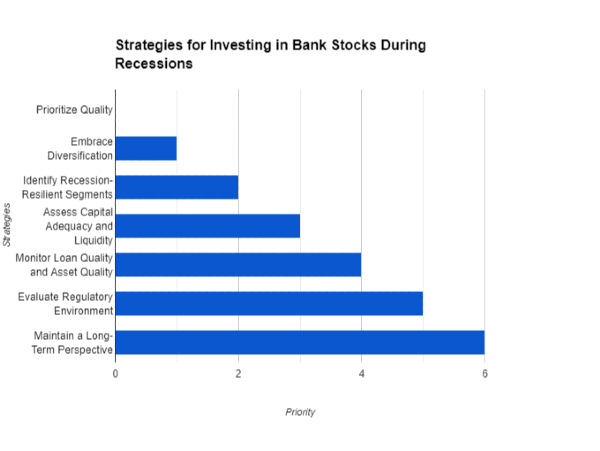
When investing in bank stocks during recessions, you need a strategy. You also need a good grasp of the challenges and opportunities of economic slowdowns. In this section, we delve into tips for investors who want to make the most of the stability of bank stocks amidst pressures.
i. Prioritize Quality:
In times of recession, the significance of investing in top-notch bank stocks cannot be emphasized enough. Seek out banks with foundations, effective risk management strategies, and cautious lending practices. Companies with capital reserves have few bad loans and diverse revenue streams. They are better equipped to endure downturns and come out stronger.
ii. Embrace Diversification:
Diversification helps manage risks in an investment portfolio. It does this during recessions. Spread your investments across bank stocks, sectors, and regions. This will reduce exposure to any one company or market. Consider expanding your portfolio beyond banks. Add financial firms like insurance companies and asset managers. They may offer different risks and rewards.
iii. Identify Recession-Resilient Segments:
Not all banks face the impact during slumps. Some parts of banking may prove more resilient than others.
For example, banks primarily serve customers and provide loans. They might suffer less from economic downturns. This is in contrast to banks that heavily fund commercial properties or lend to businesses. It's important to find parts of the banking industry that tend to withstand recessions. Then, invest funds based on this analysis.
iv. Assess Capital Adequacy and Liquidity:
When investing in banks during downturns, check their capital. Also, check their liquidity. Banks need capital and strong reserves. They need these to weather storms and keep stability. Seek out banks with strong capital ratios and ample reserves. They can navigate through tough times.
v. Monitor Loan Quality and Asset Quality:
Another key aspect to consider during recessions is the quality of loans and assets that banks hold. Watch out for indicators like rising loan performance ratios. Also, look for declining asset quality and increased loan loss provisions. These could show weaknesses in the bank’s loan portfolios. Assess credit underwriting standards. See how well banks can handle risk in tough times.
vi. Evaluate Regulatory Environment:
Also, consider the landscape and future rules before investing in bank stocks during recessions. Changes in rules or more regulatory scrutiny can hurt a bank's profits. They increase compliance costs and limit growth chances. Consider how they might impact a bank’s operations and earnings potential.
vii. Maintain a Long-Term Perspective:
Lastly, it's wise to maintain a long-term perspective when investing in bank stocks during recessions. In market declines, focus on the core strengths of the banks in your portfolio. Plan your investments for the long term. This means spanning years or longer. It gives room for things to get better and for the true value of your investments to become clear.
Impact of Economic Downturns on Bank Stocks

During hard times, uncertainty looms over markets. It hits bank stocks the hardest. They suffer from market ups and downs and negative investor feelings. This section explores the impact of economic downturns on bank stocks. It focuses on the factors that affect their performance during recessions.
1. Credit Quality Concerns:
Economic downturns heighten concerns. They are about credit quality in banking. Businesses and individuals struggle financially. This raises the risk of loan defaults and payment delays. These problems present challenges for banks. Performing loans hurt banks' profits. They also harm their health and push down their stock prices.
Investors track loan loss provisions. They also track non-performing loan ratios. These measures gauge a bank's loan portfolio strength.
They do this during market downturns.
2. Interest Rate Environment:
Economic downturns often come with lower interest rates. Central banks do this to spur recovery. Low interest rates can encourage borrowing. They can also encourage investment. But they also squeeze bank interest margins. Banks rely on the gap between the interest rates earned from loans and those paid on deposits. This gap generates their profits.
A decline in this difference caused by interest rates can affect the profits of banks as well as influence their share values. Also, long periods of low interest rates might flatten or invert the yield curve. This would make it hard for banks to earn profits from standard lending.
3. Reduced Economic Activity:
During downturns, there is usually less activity. This leads to lower spending by consumers and businesses. This results in a reduced demand for loans, mortgages and other financial services provided by banks. With dwindling revenue opportunities banks may feel the need to cut costs lessen lending activities. Find ways to make money to stay profitable. The slowdown in the economy also raises concerns about the quality of credit. Companies find it hard to meet their debt obligations. This affects how bank stocks perform.
4. Regulatory Environment
Moreover, when the economy takes a hit there tends to be an increase in scrutiny and risk aversion within the banking sector. Stricter oversight came after the 2008 crisis. It has enforced rigid compliance standards. It has also set higher capital requirements for banks. The costs associated with meeting these regulations can eat into banks’ profits. Limit their ability to lend money impacting their stock prices. Also, changes in regulations aim to boost stability. They can reshape how banks operate and grow. This can sway investor confidence in bank stocks during recessions.
Conclusion:
Financial institutions like banks face challenges during downturns. However, some companies are resilient. This could create opportunities for investors. They want to navigate uncertain economics. It’s crucial for new investors to do their homework. They must evaluate risks and diversify their investments wisely. Top investors understand how financial stocks behave. This helps them in downturns. It lets them make smart choices to protect their assets and seize opportunities. This is true even when faced with uncertain economic conditions.
For more information watch this video:
https://youtu.be/yD-PzQCiijI




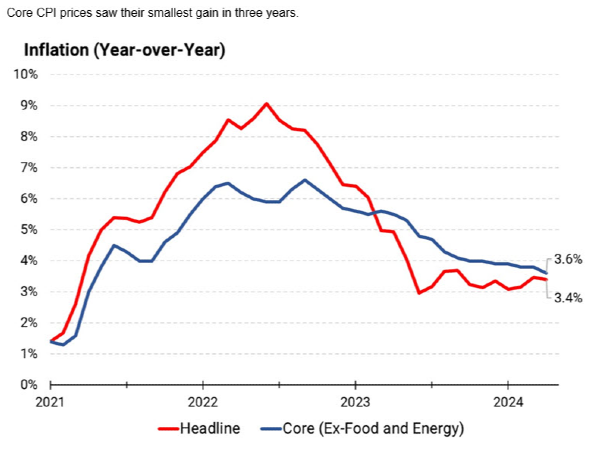






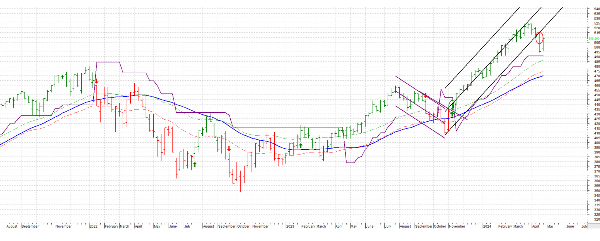


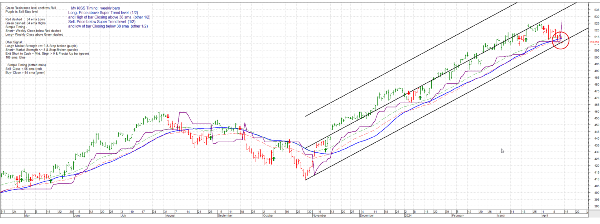




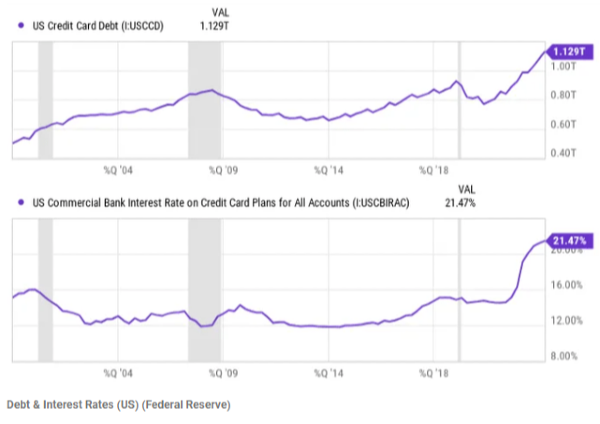










Expertise provided by Kevin Matthews from buildingbread.com
In the realm of investments, a burning question arises; do financial stocks remain stable in times of downturns? Economic downturns typically result in a downturn, in the stock market affecting stocks as well. Financial institutions like banks, investment firms, and insurance companies often encounter hurdles during economic times. This question holds importance for novice investors looking for security amidst uncertainties.
Understanding Bank Stocks in Recessions:
Before we talk about stocks, understand how bank stocks do in downturns. As mentioned earlier, recessions usually hurt stocks. However, financial stocks face extra challenges. This is due to their sensitivity to cycles.
Factors Affecting Bank Stock During Recession
During recessions several factors impact stocks;
i. Deterioration in Credit Quality
Economic contractions can lead to more loan defaults and delinquencies. These hurt banks' financial health.
ii. Decreasing Interest Rates
Central banks often reduce interest rates to stimulate the economy during recessions. This may encourage borrowing, but it puts pressure on banks' margins and profits.
iii. Decline in Economic Activities
Recessions reduce consumer and business spending. This leads to lower demand for loans, mortgages, and other financial services.
Historical Performance:
In looking at how financial stocks have fared in recessions it's important to examine the available data. Exact figures are not in the record., but, common observations show that financial stocks struggle in downturns. The 2008 financial crisis stands out as an example of the challenges faced by the industry in times of recession.
Warren Buffet's support, for Visa even though it falls under the stock category highlights its position in the market. Visa can withstand downturns. This is because its business model prioritizes transaction fees over lending.
Best Bank Stocks for Economic Downturns
In times of recession specific bank stocks have proven their resilience. Might be worth considering for a recession investment portfolio. Here are three top bank stocks that investors should keep an eye on;
1. JPMorgan Chase & Co. (NYSE; JPM)
JPMorgan Chase is a diversified bank. It offers many financial services. These include investment banking, asset management, and consumer banking. Its balance sheet is strong. The company has diverse revenue streams. It also uses effective risk management strategies. These factors position it well during challenging times.
2. Bank of America Corporation (NYSE; BAC)
Bank of America holds a position in banking and key markets. Fluctuations have impacted the bank. But, it has improved asset quality and efficiency a lot. Additionally, it focuses on banking and cost effectiveness. This strengthens its resilience in uncertain times.
3. Western Alliance Bancorporation NYSE: WAL
Western Alliance, listed on the New York Stock Exchange as WAL is well known for its approach, to lending and careful risk assessment. These strategies have proven effective in navigating challenges successfully. Western Alliance emphasizes banking services. Its income stream includes payment processing and wealth management. This puts it in a strong position to endure economic downturns.
Strategies for Investing in Bank Stocks During Recessions
When investing in bank stocks during recessions, you need a strategy. You also need a good grasp of the challenges and opportunities of economic slowdowns. In this section, we delve into tips for investors who want to make the most of the stability of bank stocks amidst pressures.
i. Prioritize Quality:
In times of recession, the significance of investing in top-notch bank stocks cannot be emphasized enough. Seek out banks with foundations, effective risk management strategies, and cautious lending practices. Companies with capital reserves have few bad loans and diverse revenue streams. They are better equipped to endure downturns and come out stronger.
ii. Embrace Diversification:
Diversification helps manage risks in an investment portfolio. It does this during recessions. Spread your investments across bank stocks, sectors, and regions. This will reduce exposure to any one company or market. Consider expanding your portfolio beyond banks. Add financial firms like insurance companies and asset managers. They may offer different risks and rewards.
iii. Identify Recession-Resilient Segments:
Not all banks face the impact during slumps. Some parts of banking may prove more resilient than others. For example, banks primarily serve customers and provide loans. They might suffer less from economic downturns. This is in contrast to banks that heavily fund commercial properties or lend to businesses. It's important to find parts of the banking industry that tend to withstand recessions. Then, invest funds based on this analysis.
iv. Assess Capital Adequacy and Liquidity:
When investing in banks during downturns, check their capital. Also, check their liquidity. Banks need capital and strong reserves. They need these to weather storms and keep stability. Seek out banks with strong capital ratios and ample reserves. They can navigate through tough times.
v. Monitor Loan Quality and Asset Quality:
Another key aspect to consider during recessions is the quality of loans and assets that banks hold. Watch out for indicators like rising loan performance ratios. Also, look for declining asset quality and increased loan loss provisions. These could show weaknesses in the bank’s loan portfolios. Assess credit underwriting standards. See how well banks can handle risk in tough times.
vi. Evaluate Regulatory Environment:
Also, consider the landscape and future rules before investing in bank stocks during recessions. Changes in rules or more regulatory scrutiny can hurt a bank's profits. They increase compliance costs and limit growth chances. Consider how they might impact a bank’s operations and earnings potential.
vii. Maintain a Long-Term Perspective:
Lastly, it's wise to maintain a long-term perspective when investing in bank stocks during recessions. In market declines, focus on the core strengths of the banks in your portfolio. Plan your investments for the long term. This means spanning years or longer. It gives room for things to get better and for the true value of your investments to become clear.
Impact of Economic Downturns on Bank Stocks
During hard times, uncertainty looms over markets. It hits bank stocks the hardest. They suffer from market ups and downs and negative investor feelings. This section explores the impact of economic downturns on bank stocks. It focuses on the factors that affect their performance during recessions.
1. Credit Quality Concerns:
Economic downturns heighten concerns. They are about credit quality in banking. Businesses and individuals struggle financially. This raises the risk of loan defaults and payment delays. These problems present challenges for banks. Performing loans hurt banks' profits. They also harm their health and push down their stock prices. Investors track loan loss provisions. They also track non-performing loan ratios. These measures gauge a bank's loan portfolio strength. They do this during market downturns.
2. Interest Rate Environment:
Economic downturns often come with lower interest rates. Central banks do this to spur recovery. Low interest rates can encourage borrowing. They can also encourage investment. But they also squeeze bank interest margins. Banks rely on the gap between the interest rates earned from loans and those paid on deposits. This gap generates their profits.
A decline in this difference caused by interest rates can affect the profits of banks as well as influence their share values. Also, long periods of low interest rates might flatten or invert the yield curve. This would make it hard for banks to earn profits from standard lending.
3. Reduced Economic Activity:
During downturns, there is usually less activity. This leads to lower spending by consumers and businesses. This results in a reduced demand for loans, mortgages and other financial services provided by banks. With dwindling revenue opportunities banks may feel the need to cut costs lessen lending activities. Find ways to make money to stay profitable. The slowdown in the economy also raises concerns about the quality of credit. Companies find it hard to meet their debt obligations. This affects how bank stocks perform.
4. Regulatory Environment
Moreover, when the economy takes a hit there tends to be an increase in scrutiny and risk aversion within the banking sector. Stricter oversight came after the 2008 crisis. It has enforced rigid compliance standards. It has also set higher capital requirements for banks. The costs associated with meeting these regulations can eat into banks’ profits. Limit their ability to lend money impacting their stock prices. Also, changes in regulations aim to boost stability. They can reshape how banks operate and grow. This can sway investor confidence in bank stocks during recessions.
Conclusion:
Financial institutions like banks face challenges during downturns. However, some companies are resilient. This could create opportunities for investors. They want to navigate uncertain economics. It’s crucial for new investors to do their homework. They must evaluate risks and diversify their investments wisely. Top investors understand how financial stocks behave. This helps them in downturns. It lets them make smart choices to protect their assets and seize opportunities. This is true even when faced with uncertain economic conditions.
For more information watch this video:
https://youtu.be/yD-PzQCiijI